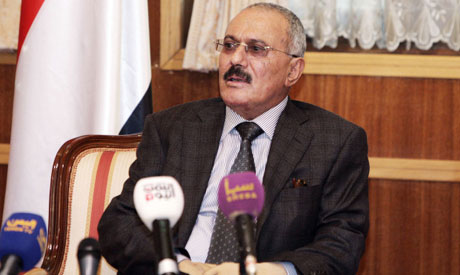
Yemeni President Ali Abdullah Saleh.( Photo: AP)
Barely clinging to power, Yemeni President Ali Abdullah Saleh arrived in the United States on Saturday, apparently to treat burns and other wounds suffered in an assassination attempt in June.
U.S. and Yemeni officials confirmed his arrival for a private, short-term medical visit but withheld details. An aide said he was headed to New York but his whereabouts could not be confirmed.
Saleh, who has ruled the impoverished Arabian Peninsula country for more than three decades, travelled to the United States after spending a week in Oman under a plan for him to step down to end a year of protests against his rule.
Under a power transfer plan drawn up by Gulf Arab countries, Vice-President Abd-Rabbu Mansour Hadi is presiding over a national unity government with presidential elections set for Feb. 21.
U.S. officials first revealed in December Saleh wanted into the country for medical treatment for lingering injuries suffered on June 3, when a bomb blast ripped through a mosque within the presidential palace.
Saleh escaped with his life but suffered burns over much of his body. He went to Saudi Arabia for treatment after the attack and returned to Yemen in September.
Saleh, however, has publicly denied he needed medical attention, saying in December he planned to return to Yemen after a few days in America to help prepare for elections.
The attempt on Saleh's life came after he tried to duck the power-transfer accord, leading to street battles that devastated parts of the Yemeni capital.
Hundreds of people were killed during months of protests seeking Saleh's ouster, part of the Arab Spring that toppled leaders in Tunisia, Egypt and Libya and rattled other countries such as Syria.
Gulf Arab and Western allies fear turmoil in Yemen has given al Qaeda militants room to further entrench themselves in remote areas outside central government control.
Saleh has transferred some powers to his deputy and enjoys immunity from prosecution under the deal meant to end increasing instability in Yemen.
The deal established a transitional government that will include the opposition and envisions restructuring Yemen's armed forces, which has Saleh's relatives in powerful posts.
The United States endorsed the plan to coax Saleh out of office by granting him immunity from prosecution over the deaths of protesters, and Washington has defended its decision to issue him a visa, despite criticism it would be seen as sheltering him.
Short link: